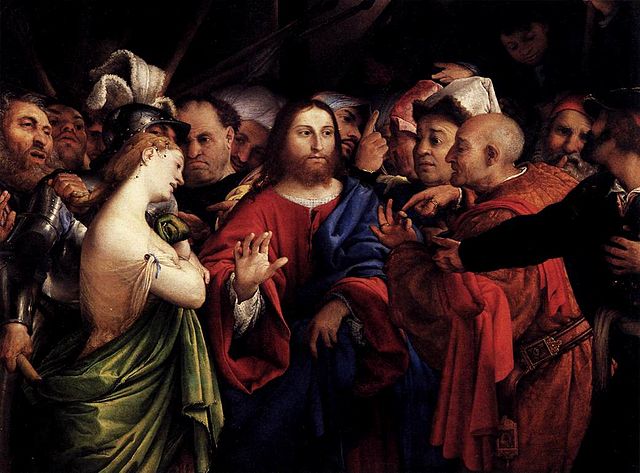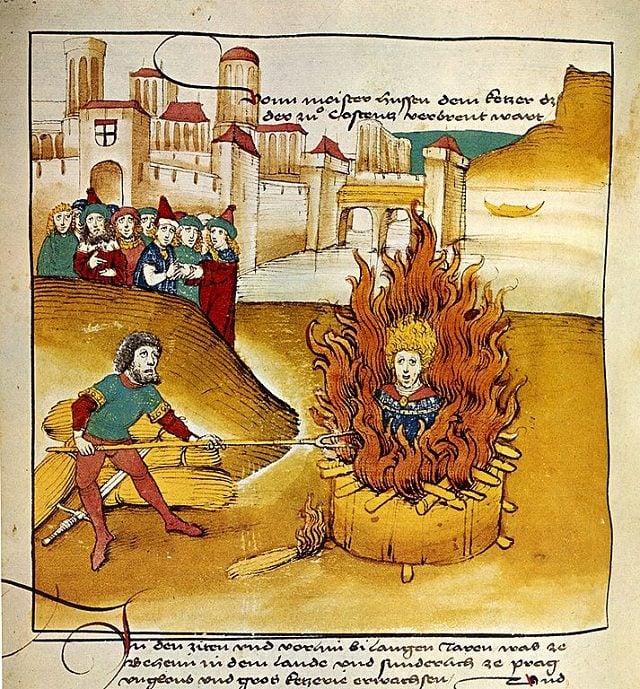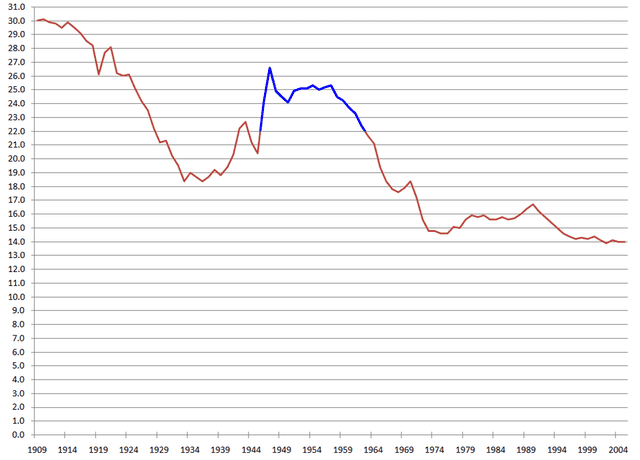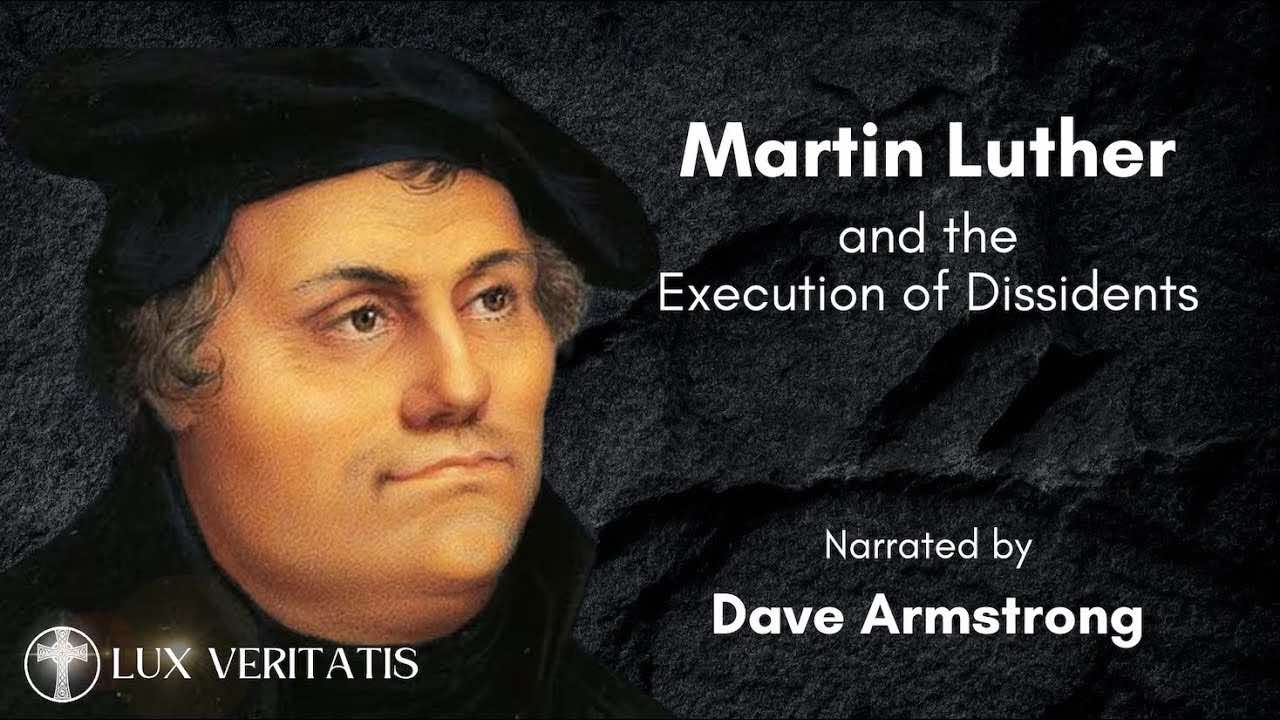Preliminaries and Whether Genesis 9:6 is Proverbial Literature

My post, “Capital Punishment: I’ve Changed My Mind” (12-5-17) has generated vigorous discussion on Facebook and in its own combox. Dr. Feser showed up in the latter, last night. We had a very minor dispute about how many (and which) links of his I provided in my paper. I added further ones at his request. Then we had the following little exchange. His words will be in blue. Dr. Robert Fastiggi’s words will be in green. After that, I will make an argument in favor of Genesis 9:6 being proverbial, rather than a literal instance of primeval law related to capital punishment.
*****
A few comments: First, if you want to take Fastiggi’s side in his dispute with me, that’s fine, but before doing so you ought to be clear on what we are actually disagreeing about. What Fastiggi and I have been debating at Catholic World Report is, specifically, whether the Church could in the future teach that capital punishment is always and intrinsically immoral. I have argued that the Church cannot teach that — because such an extreme claim would contradict scripture and 2000 years of consistent teaching — and judging from what you say here in your combox, it seems you might agree with me about that. But Fastiggi seems to have been arguing at CWR that the Church could teach this. So I’m not clear exactly why you think it is Fastiggi, and not me, who is correct in the dispute between us.
If Fastiggi has said in the private conversations you seem to have had with him that he does not think that capital punishment is always and intrinsically wrong, then I am glad to hear that. but in that case he ought to make that clear in his public remarks, because he seems to be saying the opposite in his CWR articles.
Second, . . . [later resolved dispute about links that I won’t bore readers with]
Third, the scriptural claims from Brugger, Hart, McClamrock, and Fastiggi that you cite are claims I have replied to at length in the responses just referred to. I have shown why their arguments are no good. Simply saying “But Feser is a philosopher and Hart and Fastiggi are theologians” cuts no ice. What matters are the merits of the actual arguments they give and the actual arguments I give, and I have shown that their arguments are bad. But you won’t know that unless you actually bother to read what I wrote.
If you don’t have time or interest in doing so, fine. But in that case, you shouldn’t have written this blog post. For unless you are willing to address what both sides have said, you really have no business claiming that the critics are right and Joe Bessette and I are wrong.
Thanks for commenting. You probably don’t know much about me, but I have admired your work for a long time and massively linked to it (not just on this topic). I urged Mark Shea to have you on his show. I have no hostility towards you. . . .
I don’t have unlimited time, but I love to debate, so I am not the person to go after regarding a supposed fear on my part to do so, or to chide for not reading your side, etc. I’ve been reading both sides (but not absolutely everything, as I cover a lot of topics in my job as an apologist). I already stated that I’d like to see what you said about the exegesis, and would probably like to do some dialogue on that (knowing that you would). . . .
This paper was . . . a report about my change of mind. It was not intended to be an exhaustive study, as I said, let alone a full account of both sides of the current raging debate.
I just changed my mind two nights ago. I’m not in a place to exhaustively comment on all this stuff (don’t you think that would be rather presumptuous of me?), . . . I can do a fair job in exegetical discussion. Me being a Catholic apologist with a strong emphasis on Bible, and you being a philosopher: that might be a more or less fair debate. Neither one of us are professional exegetes. That does make some difference, don’t you agree?
It’s also absurd to say that I shouldn’t have written this blog post. It’s about my change of opinion. I don’t claim to have all knowledge on the topic. I restricted myself only to the exegetical arguments, and gave the ones the anti-death penalty folks gave, just so people could see that there are conceivable answers to your claims.
In our group discussion at my home on Saturday with Dr. Fastiggi (we’ve been friends for over ten years and he’s been to my house many times), my impression was that he does not think it is intrinsically evil. That’s not how he framed his entire presentation, and not how he convinced me, since I have held for years that it was not such (in contradistinction to abortion). I don’t believe he thinks the Church could proclaim it to be in the future, either.
He certainly doesn’t think that Pope Francis is teaching this now. In his second reply to you, he stated: “He has also taught that it is ‘per se contrary to the Gospel’ (Address of Oct. 11, 2017). He has not yet condemned capital punishment as intrinsically immoral, . . .” I suppose one could be concerned with the seemingly “pregnant” use of “yet” there. In the combox for this article, he reiterated the same thing twice:
His statement that capital punishment is “per se contrary to the Gospel” need not mean that it is intrinsically evil. Divorce, after all is contrary to the Gospel, but the Church tolerates civil divorce is some cases (see CCC 2383); and God also permitted divorce and remarriage in the Old Testament. Polygamy is contrary to the Gospel, but it likewise was tolerated in the OT, and St. Thomas Aquinas thought that polygamy was against the natural law in one way (with regard to marital fidelity) but not against it in another way (with regard to procreation; see ST Suppl. q. 65 a. 1).
In my article I made it clear that Pope Francis has not yet taught that the death penalty is intrinsically evil. He has, though, stated that it is against the Gospel.
If you think he believes that the Church could / might teach this in the future, what exactly did he write to give you that impression? If he did write something to that effect, it had to be using a synonym of “intrinsic” because I searched that word in his articles and I found what you see above.
I don’t find Fastiggi’s position clear at all. In my exchanges with him, I’ve always emphasized the specific point that the Church cannot teach that capital punishment is always and intrinsically wrong, and I’ve emphasized that she would be contradicting scripture, the Fathers, and all previous popes if she made such a radical reversal of teaching. And he consistently tries to challenge these arguments. He never says: “Yes, you’re correct that the Church couldn’t teach that, but what I disagree with you about this or that other thing.” Rather, his emphasis always seems to be on the claim that I have not shown that the Church couldn’t make such a radical change. And he consistently avoids addressing the question of how such a dramatic reversal of teaching could fail to damage the Church’s credibility — where the Church’s credibility, which rests on consistency, has always been far and away my main concern.
My guess is that he doesn’t want to commit himself right now to the thesis that capital punishment is always and intrinsically immoral, but also doesn’t want to come out and say that the Church couldn’t teach that. I suspect that he wants to leave wiggle room for that. But whether the Church could teach that — whether there really is any wiggle room here — is the main issue between us, so insofar as he persistently fails straightforwardly and frankly to take a stand on that, I find the exchange frustrating. I think he should frankly come out and take a clear stand on that, and then we could have a more fruitful exchange.
This is why I’m also a bit puzzled by why you think his position is strong, because it seems to me that he isn’t actually trying to argue for exactly the view you are taking. I think he’s trying to (re-)interpret scripture, and to minimize patristic and papal statements that are problematic for the “always and intrinsically wrong” position, so as to open a door for such a radical change, in case Pope Francis or some other pope ever wants to go there. And I gather that you would be less comfortable with such an extreme view.
So, I would urge caution in considering his arguments.
I wrote and asked him about this very question, so we’ll see what he says. As for me: I didn’t change all that much. I was already against capital punishment except for mass murderers and terrorists. He provided enough food for thought for me to be totally against it, for various reasons: some of which I discussed on my Facebook page today.
It does matter if teaching was definitive, magisterial, infallible or not. He says it wasn’t on this topic. If I understand you correctly, you were saying that it was. If he’s correct, contradiction or reversal would not be technically present in a scenario of non-magisterial teaching x being replaced by magisterial teaching y. The contradiction would only be if x was also magisterial.
As an analogy, Molinism and Thomism are both now allowed as interpretations of predestination (I’m a Molinist). Neither is infallibly proclaimed. The Church, after further development, could in the future possibly proclaim one or the other as infallible teaching. That wouldn’t be a contradiction, because neither is required and binding now. Either one can be held. But if one is eventually proclaimed as infallible and binding, then the other could not be held by a Catholic. Dollinger and the Old Catholics thought that papal infallibility was a radical reversal in 1870 (and he was a learned historian). But it was not.
So it comes down to classification of the teaching in the past and now. That’s Bob’s area of expertise as a systematic theologian, editor and translator of Denzinger, and also of a revised version of Ludwig Ott [Fundamentals of Catholic Dogma]. So I wouldn’t be quick at all to dismiss him when he talks about those topics (even if I disagreed with him).
This is my correspondence with Dr. Fastiggi last night:
I wanted to ask you specifically if your opinion is that the Church might in the future declare the death penalty intrinsically immoral (and/or if Pope Francis would). . . .
I explained to him [Dr. Feser] that you were definitely not saying that the Holy Father is teaching that now, and cited three of your comments in one of your articles and two comments underneath it. I also said that my impression (from Saturday) was that you were not teaching that it could or would likely be so proclaimed in the future. But I’m not sure, so I thought I’d ask you, and could let him know what you said, so that can be cleared up.
My understanding is that if the Church did teach such a thing in the future, the way it could be explained as non-contradictory to the past is to note (as you have) that past teaching was not definitive or magisterial. Would that be correct? My own hunch is that the Church would not do so in the first place. But these are very deep matters, so I don’t put much stock in my mere layman’s opinion about the future.
*
You are correct that I do not believe Pope Francis has explicitly taught that capital punishment is always and intrinsically wrong. Whether he will or should in the future is another matter. I doubt he’ll invoke ex cathedra authority to do so. More likely, he’ll continue to use his ordinary papal magisterium to explain why the death penalty as used today is inadmissable and contrary to the Gospel. I think the 6th paragraph in his March 20, 2015 letter explains what he thinks is inadmissable:
[paragraph 6: “In certain circumstances, when hostilities are underway, a measured reaction is necessary in order to prevent the aggressor from causing harm, and the need to neutralize the aggressor may result in his elimination; it is a case of legitimate defence (cf. Evangelium Vitae, n. 55). Nevertheless, the prerequisites of legitimate personal defence are not applicable in the social sphere without the risk of distortion. In fact, when the death penalty is applied, people are killed not for current acts of aggression, but for offences committed in the past. Moreover, it is applied to people whose capacity to cause harm is not current, but has already been neutralized, and who are deprived of their freedom.”]
Here he makes it clear that what he finds unacceptable is putting a person to death for a past crime when the person is no longer a threat and has lost his freedom This is very much in line with what St. John Paul II has already taught.
Because I don’t believe there is a definitive, infallible Church tradition affirming the legitimacy of capital punishment, it would be theoretically possible for Pope Francis or a future Pope to condemn it entirely in an ex cathedra matter. I suspect this won’t happen. I really don’t believe this is a matter upon which the Roman Pontiff should invoke his supreme apostolic authority. Instead I would favor ongoing strong papal and episcopal statements against the use of the death penalty as described in Pope Francis’s March 20, 2015 letter (which is in the AAS). Let’s see how things develop.
I agree all down the line. On 12-6-17 we corresponded again, in order to clarify continuing erroneous charges against Dr. Fastiggi’s positions, being made on Dr. Feser’s blog by commenters other than himself:
If I misrepresent you in any way, please correct me. They keep saying you believe capital punishment is intrinsically evil (one guy today charged you with public equivocation on that score), and I keep saying that neither you nor I believe that; nor do we believe it will likely be promulgated as such. But I’ve also noted, as you did, that it could theoretically happen, since past teaching was not infallible. Several of the pro-death penalty folks seem unable to grasp these basic distinctions of category. But they can be complicated at times. I hope I haven’t confused anything, myself. One of these guys (anonymous) wrote about you:
Also, I have to call out the notion that the dispute is a matter of prudence. Fastiggi’s public remarks has all the marks of an argument from justice, not an argument from prudence. As Fastiggi has made it very clear in his public work that he is objecting to the first point Feser and Bessette are making in their book, not the second. Denial of the second follows from denial of the first, and the refusal to affirm the first and enter into legitimate debate on the second is telling of what his position is. If he has claimed to you that his position is that Feser and Bessette are correct on the first but not the second, then he needs to state that publicly. Any impartial observer would take his position to be that the death penalty is intrinsically immoral, given the form and structure of his argumentation and exactly what in Feser’s arguments he is objecting to. As he doesn’t object to any of the prudential arguments and sociological points that appear later in the book, but to the arguments from natural law and moral theology from the first half of the book. The conclusion of the first half of the book is “Capital punishment is morally licit”, that is that it may be done without sin. Not that it must be done (pace the strawman of Hart).
I didn’t answer that particular one (too long and involved). I did reply, however, to the same person as follows:
Him: You say that you, and Dr Fastiggi (contra to his public remarks), do not believe that capital punishment is malum in se.
Me: That’s correct. To my knowledge, Bob has not said otherwise.
I think you’ve been fair to my position. I try to adhere to what the recent popes have taught about capital punishment. I think so many people think that if you don’t hold that capital punishment is intrinsically evil then any arguments against it are simply “prudential.” This does not follow as I tried to explain in my comment [underneath] Feser’s article:
*
Where has Pope Francis used the term intrinsically evil in reference to capital punishment? If you can’t produce such a reference then all your assertions are but speculations. Your claim that the Pope Francis is in doctrinal error is your opinion, which has only the weight of your opinion. . . .
*
Even if the death penalty is not condemned as “intrinsically evil,” the application of it today can be condemned as “cruel and unnecessary” (St. John Paul II, 1999) and “contrary to the Gospel” (Pope Francis, 2017). The Catechism tells us that the “traditional teaching of the Church does not exclude recourse to the death penalty, if this is the only possible way of effectively defending human lives against the unjust aggressor” (CCC, 2267). Unlike the condemnation of direct abortion which is “unchangeable” (CCC, 2271), the tradition of the Church on the remote possible use of the death penalty is not qualified in the Catechism as “unchangeable.” I am not persuaded by the arguments of Prof. Feser in defense of his position that the Church’s recognition of the death penalty’s legitimacy is “definitive.”
*
If time permits, I’ll try to explain this more in a subsequent posting. I really don’t believe Pope Francis needs to condemn capital punishment as “intrinsically evil” in order to condemn its application today in very strong terms. Prof. Feser seems to believe that if the Church accepts even the most remote possibility of the use of the death penalty, then any teaching against its use is only “prudential.” This is not true at all. In order to make prudential judgments there must be principles that guide these judgments. St. John Paul II (EV, 56) and the CCC, 2267 lay out these principles. Because of the dignity of the human person (a principle not a prudential judgment) the death penalty may solely be used if it is “the only possible way of effectively defending human lives against the unjust aggressor.” Feser and Bessette seem to reject these principles as “a mistake, and a serious one” (p. 197 of their book). They try to justify their rejection of what St. John Paul II and the CCC teach as disagreements only with a prudential judgment of the Magisterium.
*
This is where they show their lack of understanding of what is needed with respect to prudential judgments. There is a need for guiding principles. Unfortunately in their book they manifest disagreement with the Magisterium’s clearly taught “principles” that are meant to guide judgments regarding capital punishment. This is why their book is a departure from present magisterial teaching. To appeal to the authority of past popes is insufficient. Where in Catholic teaching is such an appeal justified? Many Feeneyites make similar appeals as well as Catholic ‘traditionalists” who reject Vatican II’s Dignitatis humanae. I don’t doubt the sincerity and good intentions of Prof. Feser and his followers, but I really think they need to manifest religious assent to the present teaching of the papal Magisterium (cf. Vatican II, LG, 25), which follows the “hermeneutic of continuity” with the teachings of Vatican II on the dignity of the human person.
*
In my one comment (below) I explain that I have never argued that capital punishment is intrinsically evil. I think, though, it’s acceptable for Catholics to argue that position. Fr. Ginno Concetti OFM argued for that position in an article published in the Jan. 23, 1977 issue of L’Osservatore Romano. According to Feser, Concetti’s position is heretical. This would mean that the Holy See gave permission for a heretical article to be published in L’OR.
*
I think Pope Francis is invoking strong Christian principles against the use of the death penalty today. I support his position. My own thoughts can be found here[underneath one of Dr. Feser’s articles]:
*
Prof. Feser seems to assume that I have committed myself to the position that the death penalty is intrinsically immoral and it has been so throughout history. But I have never taken that position, and I agree with Feser that it’s not clear whether Pope Francis has himself taken that position in his Oct. 11, 2017 address. My position is more modest. I simply argue that there is no definitive, infallible teaching of the Church in favor of the legitimacy of capital punishment. I also argue that recent papal teachings of the death penalty merit religious assent on the part of the faithful even though they have not been set forth as definitive or infallible.
*
With regard to the historical record of magisterial pronouncements on the death penalty, I agree with Fr. Anselm Günthör, OSB (1911–2015) who wrote, “the statements of the ecclesial Magisterium [on capital punishment] are occasional assertions and do not represent a fully definitive position; we must not undervalue them, but nor should we consider them to be unchangeable and perennially valid magisterial statements” (A. Gunthor, Chiamata e risposta: Una nuova teologia morale, Vol. III, Edizioni Paoline, Alta, 1979, pp. 557-558).
*
*****
Now I shall turn my attention to the first of two key biblical passages that have been disputed, as regards the death penalty (and that I highlighted in my announcement of my change of opinion): Genesis 9:6 (RSV): “Whoever sheds the blood of man, by man shall his blood be shed; for God made man in his own image.”
Dr. Feser and co-author Dr. Joseph Bessette state in their book that “Genesis 9:6 . . . sanctions the execution of murderers precisely in the name of the victim’s dignity as a creature made in God’s image“ (p. 10; italics in original, as throughout this paragraph). And again: “[I]t is absurd to deny that Genesis 9:5-6 affirms the legitimacy in principle of capital punishment . . .” (p. 101). On page 103 they refer to “the sanction in Genesis 9:6 of the death penalty for murder, which is presented as having application to the human race in general . . .” And on page 189: “. . . Genesis 9:6 sanctions capital punishment . . .” And on page 208: “Yet Genesis 9:6 teaches that man’s being made in the image of God is precisely a reason to support capital punishment rather than a reason to oppose it.” And further on page 293: “[T]he teaching of Genesis 9:6 is that . . . the death of the offender is the required, or at least presumptive punishment.” Lastly, on page 384 the authors speak of a “solemn affirmation in Genesis 9:6 of both human dignity and capital punishment . . .”
I need to note at the outset that my goals in discussing Genesis 9:6 are not extraordinarily ambitious at all. As I prepared for this reply today I quickly realized that these are very deep waters, and that I could not possibly commit to a full debate on the subject in all its aspects, as discussed at the greatest length by Dr. Feser and his opponents. It’s too vast of a topic, and would require, in my opinion, experts in several different field to adequately tackle it and deal with it in the depth that it deserves.
There are scriptural / exegetical, patristic, magisterial, moral theological, philosophical, law vs. grace, governmental, and dogmatic theological aspects to it: all distinct from each other, and each quite capable of generating necessarily very long discussions. In my first paper on the topic, I deliberately concentrated on the scriptural arguments, for that reason (and because I know the most about that area).
Thus, I candidly expressed to Dr. Feser on my blog last night: “I just changed my mind two nights ago. I’m not in a place to exhaustively comment on all this stuff (don’t you think that would be rather presumptuous of me?).” My participation, accordingly, will be necessarily limited and confined to very specific particulars.
But even in that limited sphere, I freely grant — as regards the present passage — that historic and current exegesis of Genesis 9:6 is indeed overwhelmingly in favor of a death penalty interpretation, as Dr. Feser observes. That’s not, of course, fatal to the anti-death penalty position, since there are other considerations of how Old Testament law applies in the new covenant, etc. In any event, my meager goal is to show that there is at least some serious thinking among biblical scholars that Genesis 9:6 is of a proverbial nature, which would undermine the “legal” case that Dr. Feser builds up from it.
Religion and the Death Penalty: A Call for Reckoning, edited by Erik Owens, John D. Carlson, and Eric P. Elshtain (Grand Rapids, Michigan: William B. Eerdmans Publishing Company, 2004), offers the chapter, “Biblical Perspectives on the Death Penalty,” by Michael L. Westmoreland-White and Glen H. Stassen. They write:
Most Christian retentionists rest their biblical case primarily on a single text, Genesis 9:6, which is structured as a chiasm (i.e., using an ABB’A’ in which the second half is a mirror image of he first half):
A “Whoever sheds the blood
B of a human
B’ by a human
A’ will his blood be shed.”
[footnote: “Authors’ translation to show the chiastic order. The passage is equally well translated ‘will’ or ‘shall.’ “]
Claus Westermann, who has written what is widely recognized as the most authoritative commentary on Genesis, explains that scholars do not agree whether Genesis 9:6 is a legal penalty, a prophetic admonition, or a proverb. [footnote: Genesis 1-11 (Minneapolis: Augsburg, 1984), p. 467] (pp. 126-127)
I was able to access p. 467 of this book at the Amazon page, but, maddeningly, one can’t get to p. 468, so I couldn’t read Westermann’s complete commentary. But what can be accessed is intriguing:
The variations in the interpretation of the verse are striking. . . . J. Skinner: “possibly an ancient judicial formula which had become proverbial” . . . B. Jacob . . .: “It is not a formal legal pronouncement; a threat, a prophetic admonition.” S. McEvenue sees it quite differently: “The chiastic form and rhyming quality lean . . . toward proverb style” p. 70 (referring to E. Gerstenberger and W. Richter). He sees the clearest parallel in Mt 26:52: “. . . all who take the sword will perish by the sword.” . . . McEvenue comes to the conclusion that it has been demonstrated neither that the sentence 9:6a is very old, nor that it is a law . . . The embarrassment remains that the interpreters vary between judicial formula, proverb and prophetic admonition. . . .
The stylistic form . . . is not the equivalent of the apodictic law as such . . . the second half-verse: “by man shall his blood be poured out,” does not correspond to the style of apodictic law. The specification of the legal consequence is too general and imprecise; juridically one cannot even begin.”
But Feser and co-author Joseph Bessette conclude in their book that the argument for Genesis 9:6, holding that it is proverbial, has “no force” and that “the ‘proverbial’ reading of the passage is simply not true to the text” (p. 100). Why, then, according to Westermann, who is claimed to be the commentator par excellence for Genesis, are there “striking” differences in interpretation for this passage (causing scholarly “embarrassment”), with several exegetes holding it to be indeed proverbial? Are all these scholars out to sea without a clue?
Likewise, Glen H. Stassen and David P. Gushee (Kingdom Ethics: Following Jesus in Contemporary Context, Downers Grove, Illinois: InterVarsity Press, 2003) observe:
Both Westermann in his commentary on Genesis and Hagner in his commentary on Matthew see Jesus as interpreting the meaning of Genesis 9:6 in Matthew 26:52. And Jesus clearly interprets it as a proverb . . . This fits the fact that nowhere in the Old Testament do we see an actual case where what seem like prescriptions of the death penalty for various offenses were carried out by an Israelite criminal law system. They actually function more like declarations of the great moral seriousness of these offenses. They do not function as criminal laws . . . (p. 202)
This line of thought is one possible and plausible way to look at Genesis 9:6 (as held by many respectable exegetes); that’s all I’m saying. I don’t think it can be so easily dismissed.
***
Dr. Fastiggi in one of his articles at CWR, quotes Pope Benedict XVI citing Genesis 9:6 in a similar way:
Pope Benedict XVI, however, in his 2012 Post-Synodal Exhortation, Ecclesia in Medio Oriente, n. 26 cites Genesis 9:6 as evidence that God forbids the killing of even those who commit murder:
God wants life, not death. He forbids all killing, even of those who kill (cf. Gen 4:15-16; 9:5-6; Ex 20:13).
Dr. Feser in reply has a great deal to say about this, and I do admire his great zeal:
In particular, Fastiggi cites an exhortation in which Benedict stated: “God wants life, not death. He forbids all killing, even of those who kill (cf. Gen 4:15-16; 9:5-6; Ex 20:13).” Fastiggi comments that Benedict thereby “cites Genesis 9:6 as evidence that God forbids the killing of even those who commit murder.”
But this line of argument is problematic in several ways. First, in the exhortation in question, Pope Benedict was not addressing the subject of capital punishment. As the reader can easily verify by following the link above, the context in which he made the remark in question was a discussion of the idea of religious toleration. What the pope was saying was that the attempt to coerce others into adopting one’s own religious point of view sometimes results in violence and even killing, and that God does not approve of this. The pope was not even addressing the topic of criminal justice, the question of what sorts of punishments are appropriate, etc.
Now, it is standard methodology when interpreting papal texts to take context into account, and to be very cautious about extrapolating momentous implications about a particular subject from papal remarks made in passing in a discourse devoted to a completely different subject. But Fastiggi is blatantly violating this methodological principle in insinuating that Benedict’s remark implies some radical reinterpretation of Genesis 9:6 and, by implication, some revolutionary teaching vis-à-vis capital punishment.
Second, it is in any event highly misleading to imply, as Fastiggi does, that Benedict was “cit[ing] Genesis 9:6 as evidence that God forbids the killing of even those who commit murder.” For one thing, the pope does not pinpoint Genesis 9:6 specifically and then make an explicit comment about how to interpret it. Rather, he simply includes it in a string of Scriptural references that are implied to have some bearing – exactly what bearing, in the case of any of the individual Scriptural passages, is not specified – on God’s will vis-à-vis killing. Benedict never explicitly makes, concerning Genesis 9:6, the claim that Fastiggi attributes to him.
For another thing, it is quite ridiculous on its face to suggest that Genesis 9:6 teaches that “God forbids the killing of even those who commit murder.” This passage has for millennia consistently been understood by Catholic and Jewish exegetes to be approving of capital punishment. Even modern liberal exegetes who have tried to reinterpret it have only ever claimed that the passage is neutral about capital punishment, and they have had to strain credulity to go even that far (for reasons Joe Bessette and I explain in our book). To suggest, as Fastiggi does, that the passage is actually condemning capital punishment, is simply perverse. Quite frankly, it doesn’t pass the laugh test.
Nor is it remotely plausible to attribute such an interpretation to Pope Benedict XVI. As Joe Bessette and I note in our book, Cardinal Ratzinger (who went on to become Pope Benedict XVI) explicitly stated in 2004 that “it may still be permissible… to have recourse to capital punishment” and that “there may be a legitimate diversity of opinion even among Catholics about… applying the death penalty.” He could not have said such things if he believed that Genesis 9:6 absolutely forbade the execution of murderers.
Fastiggi tries to downplay the significance of this 2004 statement, but he has no good grounds for doing so. The statement was an official memorandum from the head of the Congregation for the Doctrine of the Faith – the chief doctrinal officer of the Church – sent to a bishop, Cardinal McCarrick, for the purpose of clarifying the implications of Church teaching for how the faithful ought to form their consciences when deciding how to vote. How could this possibly not be relevant to determining what the Church intends for the faithful to believe?
I strongly disagree that this is out of context. This document was about “The Church in the Middle East” and has obvious connections with violence and death. That was precisely the time that ISIS was running rampant and slaughtering Christians. Thus there is a connection in subject matter. The pope refers to persecution to the death in section 8:
Yet this blessed land and its peoples have tragically experienced human upheavals. How many deaths have there been, how many lives ravaged by human blindness, how many occasions of fear and humiliation! It would seem that there is no end to the crime of Cain (cf. Gen 4:6-10 and 1 Jn 3:8-15) among the sons of Adam and Eve created in God’s image (cf. Gen 1:27). Adam’s transgression, reinforced by the sin of Cain, continues to produce thorns and thistles (cf. Gen 3:18) even today. How sad it is to see this blessed land suffer in its children who relentlessly tear one another to pieces and die!
“Persecution” in the region is referred to three times. Thus, the immediate context of religious freedom must be seen as part of the whole document; and it includes reference to the deprivation of such freedom, to worship “without endangering one’s life and personal freedom”. He refers to “deadly assaults” and “constraint” and “exploitation” and “violence leading to death.” Then in the very next sentence, he writes: “God wants life, not death. He forbids all killing, even of those who kill (cf. Gen 4:15-16; 9:5-6; Ex 20:13).” It’s quite in context with the entire document, and especially the paragraph leading up to it. Here it is:
26. Religious freedom is the pinnacle of all other freedoms. It is a sacred and inalienable right. It includes on the individual and collective levels the freedom to follow one’s conscience in religious matters and, at the same time, freedom of worship. It includes the freedom to choose the religion which one judges to be true and to manifest one’s beliefs in public. It must be possible to profess and freely manifest one’s religion and its symbols without endangering one’s life and personal freedom. Religious freedom is rooted in the dignity of the person; it safeguards moral freedom and fosters mutual respect. Jews, with their long experience of often deadly assaults, know full well the benefits of religious freedom. For their part, Muslims share with Christians the conviction that no constraint in religious matters, much less the use of force, is permitted. Such constraint, which can take multiple and insidious forms on the personal and social, cultural, administrative and political levels, is contrary to God’s will. It gives rise to political and religious exploitation, discrimination and violence leading to death. God wants life, not death. He forbids all killing, even of those who kill (cf. Gen 4:15-16; 9:5-6; Ex 20:13).
Dr. Feser claims that citing the final two sentences is making reference to a statement “made in passing in a discourse devoted to a completely different subject.” I respectfully submit that neither thing is true. It’s not a “passing statement” at all. It’s arguably a climactic conclusion of the entire paragraph. Nor is the topic “completely different.” Persecution is always front and center in any discussion of Christians in the Middle East in our time. Thus, Pope Benedict notes that God “forbids all killing, even [what is reasonably interpreted as capital punishment].” We’ve been discussing Genesis 9:6. Here are the other two passages he then cited (RSV):
Genesis 4:15-16 Then the LORD said to him, “Not so! If any one slays Cain, vengeance shall be taken on him sevenfold.” And the LORD put a mark on Cain, lest any who came upon him should kill him. [16] Then Cain went away from the presence of the LORD, and dwelt in the land of Nod, east of Eden.
Exodus 20:13 You shall not kill.
In Genesis 4, God gives Cain a mark “lest any who came upon him should kill him.” So that’s a “don’t kill” passage, as is obviously, Exodus 20:13. Then we have Genesis 9:5-6 in the middle. If we follow Dr. Feser, it’s about killing in capital punishment, rather than not killing (in general). This is what brings about, with all due respect, an implausible interpretation, since Pope Benedict would be providing three biblical passages in support of God forbidding “all killing”, whose meaning are 1) don’t kill, 2) kill [capital punishment], and 3) don’t kill. Does that make sense?
Dr. Feser then notes that lots of other folks for four thousand years have interpreted Genesis 9:6 otherwise, but that’s ultimately irrelevant to the point at hand: how Pope Benedict is interpreting and using it in this passage.
Then he mentions Cardinal Ratzinger’s “Worthiness to receive Holy Communion”: the very document I refer to in my initial paper, by which I justified my former position. As the link notes, this was “a confidential letter sent by Cardinal Ratzinger to Cardinal Theodore McCarrick and Bishop Wilton Gregory.” That’s not magisterial at all. In fact, it was “leaked” to the press. Likewise, apologists like myself and Catholic theologians and historians have defended Pope Honorius against supposedly having infallibly promulgated heresy, by noting that the material in question was also of the nature of private correspondence. It’s not on a par at all with an Apostolic Exhortation from a pope, as was the case in the previous instance.
But he does express an opinion, and this cannot be dismissed (I agree). Cardinal Ratzinger says that being “at odds with the Holy Father on the application of capital punishment” is not sufficient to be denied Holy Communion. And he notes that “There may be a legitimate diversity of opinion even among Catholics about waging war and applying the death penalty . . .” Whatever implications that has, they are not magisterial (a Cardinal’s opinions in a private letter can never be that), and light years away from having an infallible, binding status on Catholics.
But Dr. Feser neglects another factor. He contended that the topic of the Exhortation was religious toleration, not criminal justice or punishments, including the death penalty. Therefore, so he reasoned, the quote can be dismissed, and we can’t know the pope’s exact meaning anyway.
But what do we have here? It’s analogously the same scenario, but even more removed from the topic of capital punishment (if we are to consider context). “Worthiness to receive Holy Communion” is certainly as topically distant from capital punishment (if not more so) as “The Church in the Middle East”. Grounds for a Catholic being denied Holy Communion is a long ways indeed from what a Catholic ought to believe, as the highest ideal in the matter of whether we should put captive prisoners to death or not. In the second instance, he is referring (in a private letter, as a Cardinal) to what Catholics may and do believe. In the first (in an Apostolic Exhortation, as pope), to the sweeping, dramatic truth that “God wants life, not death. He forbids all killing, even of those who kill.” This is talking about what God forbids, and is as straightforward as it can be.
In an address to Cardinals, published on 8 April 1991, Cardinal Ratzinger stated:
1. Man is created in the image and likeness of God (Gn 1:26); the second account of creation expresses the same idea, saying that man, taken from the dust of the earth, carries in himself the divine breath of life. Man is characterized by an immediacy with God that is proper to his being, man is capax Dei and because he lives under the personal protection of God, he is “sacred”: “If anyone sheds the blood of man, by man shall his blood be shed, for in the image of God has man been made” (Gn 9:6). This is an apodictic statement of divine right which does not permit exceptions: human life is untouchable because it is divine property.
Does this preclude the death penalty? Possibly, but it’s not certain. The problem of interpretation comes from asking the question: “which human life is untouchable?” Is the life of the murderer also untouchable? Or is he the exception to the rule because he took the “untouchable” life of another human being?
We know that Pope Benedict XVI was opposed to the death penalty, just as his predecessor was:
I express my hope that your deliberations will encourage the political and legislative initiatives being promoted in a growing number of countries to eliminate the death penalty and to continue the substantive progress made in conforming penal law both to the human dignity of prisoners and the effective maintenance of public order. (General Audience, 30 November 2011)
Together with the Synod members, I draw the attention of society’s leaders to the need to make every effort to eliminate the death penalty and to reform the penal system in a way that ensures respect for the prisoners’ human dignity. (Post-Synodal Apostolic Exhortation Africae Munus, November 2011)
***
Photo credit: The Woman Taken in Adultery (1529), by Lorenzo Lotto (b. 1480) [public domain / Wikimedia Commons]
***



























